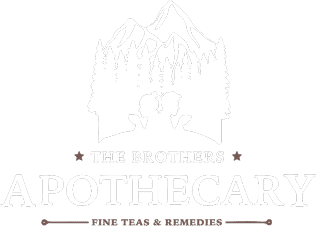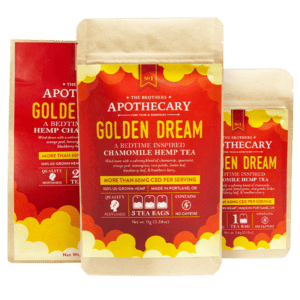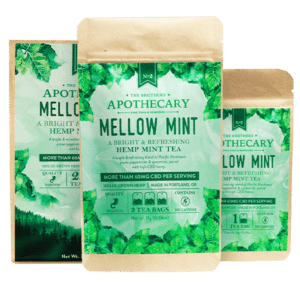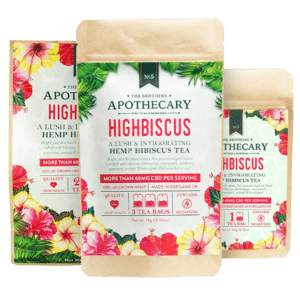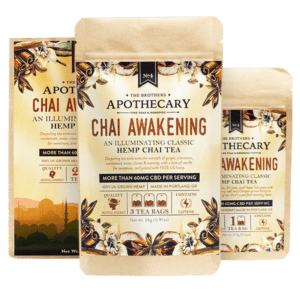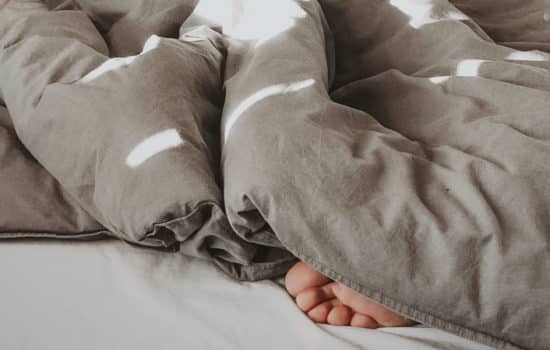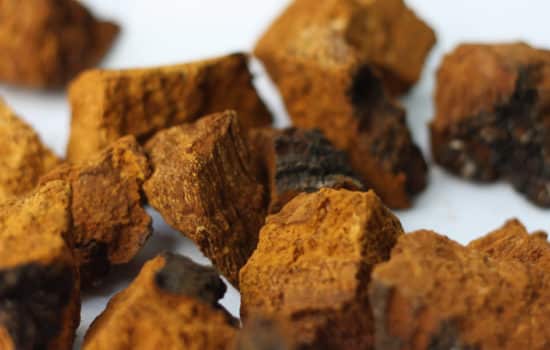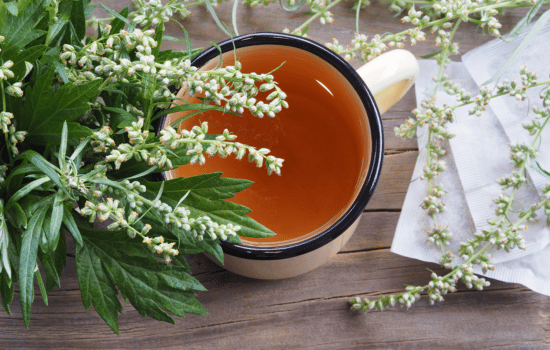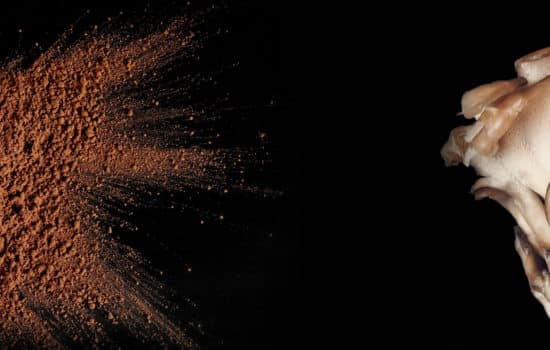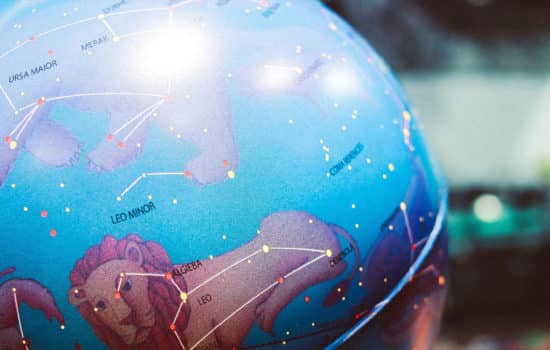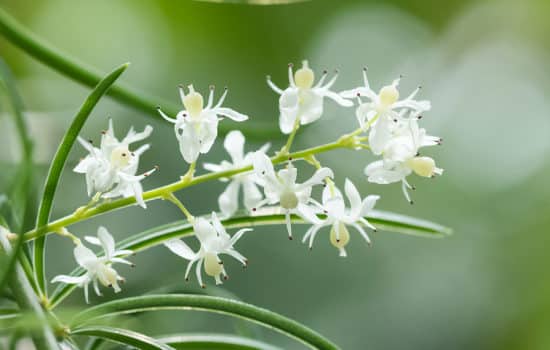As CBD becomes increasingly popular and with all the different ways CBD can be used, it can be difficult to keep track of the basics. Like, what is CBD? What types of CBD are out there? How does it work, and which is right for me?
If you’re interested in the benefits of CBD but are feeling overwhelmed with all of the information and terminology out there, don’t worry. The Brothers created this guide to give you the rundown on all you need to know when getting started with CBD!
What Are the Different Types of CBD?
Any CBD product you find will contain one of three types of CBD extract: full-spectrum CBD, broad-spectrum CBD, or isolated CBD. The difference between the three is what other plant parts are included in the final product.
All legal CBD products use CBD derived from industrial hemp plants. Legally, hemp plants cannot contain more than 0.3% THC content (we’ll discuss this in more depth below!).
Once CBD is extracted from the hemp plant, typically through a process called supercritical CO2, it goes through a filtration process. During this stage, different plant parts are filtered out depending on the type of CBD being made.
Full-Spectrum CBD
Full-spectrum CBD–also known as whole plant CBD–contains the full range of plant compounds natural to the hemp plant. This includes all of the plant’s many cannabinoids, terpenes, flavonoids, and healthy fatty acids. And, since industrial hemp can include up to 0.3% THC content as of the 2018 Farm Bill, full-spectrum CBD will contain low amounts of the THC cannabinoids as well.
Full-spectrum CBD is popular because it can produce the entourage effect. The entourage effect takes place when the CBD, THC, terpenes, and other cannabinoids interact together to enhance the effects of one another. Research suggests that even trace amounts of THC in a CBD product can produce stronger benefits than CBD would provide on its own.
Broad-Spectrum CBD
Like full-spectrum CBD, broad-spectrum CBD includes plenty of other plant parts. The only difference is that there is no THC in broad-spectrum extract.
Because broad-spectrum CBD still contains hundreds of cannabinoids and terpenes, it can still produce the entourage effect, although a slightly less effective version than full-spectrum produces.
Broad-spectrum CBD products are ideal for anyone who wants to experience the benefits of the entourage effect, but are sensitive to THC or can’t risk the possibility of THC showing up on a drug test.
CBD Isolate
Just like the name suggests, CBD isolate is an isolated form of CBD, containing none of the other cannabinoids, terpenes, or other plant parts.
During the extraction and filtration process, the CBD is isolated from all other plant compounds, and those other plant parts are filtered out. What’s left is an extract that is over 99% pure CBD.
While CBD isolate doesn’t produce the entourage effect, it is easily digestible and preferred by many who are sensitive to THC or other cannabinoids.
What Are Cannabinoids?
Cannabinoids are the main chemical compounds found in the cannabis plant. While CBD, or cannabidiol, is the most abundant and active compound in the hemp plant–which is a type of cannabis plant–there are many lesser-known cannabinoids found in cannabis plants.
How Many Cannabinoids Exist?
While CBD and THC are the most recognized cannabinoids, there are over 100 known cannabinoids.
Unfortunately, because hemp production was federally banned from the 1930s until 2018, there is currently very little research into other cannabinoids. But, as hemp becomes more popular and more states legalize cannabis, more researchers are investing in learning more about other cannabinoids and their potential benefits and uses.
Right now, more research is coming out about CBN and CBG, and we are hoping to see even more discoveries and learn more about other cannabinoids as more cannabis studies take place!
Which Cannabinoids Are in Broad-Spectrum CBD?
Broad-spectrum CBD contains all of the cannabinoids found in the hemp plant except THC. So if you use a broad-spectrum product, you’ll get small amounts of CBN, CBG, CBC, and more!
How Are CBD and THC Different?
CBD and THC are the most well-known cannabinoids, largely because different strains of cannabis plants contain high levels of either one or both of these cannabinoids. For instance, mature hemp plants often contain about 25% CBD, while the Cannabis sativa plant is typically around 20% THC. In contrast, both strains only contain around 1% of the CBG cannabinoid.
While cannabis plants contain high quantities of CBD and THC, and while the two have extremely similar molecular structures, a slight variation in their arrangement sets them apart.
The small molecular variation between CBD and THC leads to their main difference: THC, also known as tetrahydrocannabinol, is psychoactive, meaning it is capable of causing a high.
Is CBD Psychoactive?
Unlike THC, CBD is not psychoactive, and cannot lead to an altered mental state, even when taken in large doses.
So what makes THC psychoactive while CBD is not? Researchers think it has to do with how each cannabinoid works within the endocannabinoid system (also known as the ECS), which we’ll discuss more below.
Due to the molecular variation, THC is thought to bind directly with cannabinoid receptors in the brain, allowing it to produce more intense cognitive effects. This is why THC can cause a sense of euphoria or shifts in perception, and also why it can sometimes cause anxiety and paranoia.
Since CBD doesn’t bind directly with cannabinoid receptors, it’s effects on our mental wellbeing are often more subtle. CBD can help calm the mind and promote a sense of relaxation, but it won’t alter your mental state.
This holds true even if you’re using full-spectrum CBD. Since the legal cap on The legal limit of 0.3% THC content in CBD products is enough to produce the beneficial entourage effect, but not enough to produce any psychoactive effects, even when taken in high doses.
Do All Forms of CBD Contain THC?
If you prefer a CBD product with no trace of THC, you still have options! Neither broad-spectrum nor isolated CBD contain any THC.
However, make sure you are using a product that is third-party tested from a company that is transparent with their test results. Third-party testing ensures that product ingredients and doses are accurately labeled. So if you’re using a product that says it is THC-free, you can verify that with the test results.
All of our products here at the Apothecary have QR codes on the label leading to their full third-party test results!
Will CBD Show Up on a Drug Test?
While drug tests don’t test for CBD, they do look for THC. This means that–while unlikely–it is possible for the small and legal amount of THC included in full-spectrum CBD products to produce a positive drug test result.
If you are concerned about the possibility of THC showing up on a drug test, it’s best to stick to trusted, third-party tested broad-spectrum or isolated CBD products.
In rare cases, inconsistencies in extraction and testing can mean that extremely low levels of THC (well below the 0.3% legal limit) may still end up in broad-spectrum or isolated products. The chance of this is low, and it is extremely unlikely that an isolated or broad-spectrum product will result in a positive drug test.
How Does the Endocannabinoid System Work?
We’ve gone over how CBD and THC work differently with the cannabinoid receptors in the endocannabinoid system, but what exactly is this endocannabinoid system?
While the endocannabinoid system may have been left out of your high school biology class, it is an important internal messaging system that all humans and animals have, regardless of whether you’ve ever consumed plant cannabinoids like CBD and THC before. How? Because your body actually produces its own set of cannabinoids called endocannabinoids.
Endocannabinoids are naturally produced chemical messages that the ECS can send throughout the central and peripheral nervous system. These chemical messages help maintain homeostasis within the body by responding to pain signals and helping to regulate sleep, mood, appetite, and more.
When the body’s natural equilibrium is out of balance–maybe due to high stress levels or a swollen joint–the ECS responds by producing endocannabinoids and sending them to the source of the irregularity. From there, endocannabinoids are activated by binding with cannabinoid receptors. Cannabinoid receptors–including cb1 and cb2 receptors–exist throughout the body: in the brain, in major organs, throughout the musculoskeletal system, in skin cells, and in immune cells. Once activated, endocannabinoids can help provide relief as needed.
After the cannabinoids and cannabinoid receptors work to restore balance, enzymes break the endocannabinoids back down into their most basic form.
Because phytocannabinoids like CBD are chemically similar to our endocannabinoids, they can work within the ECS to provide support wherever it is needed.
Does Each Type of CBD Work Differently?
Full-spectrum, broad-spectrum, and isolated CBD are all capable of working within the ECS to help promote relaxation, lower stress, and relieve physical discomfort.
But, since THC is thought to bind directly with cb1 receptors found in the central nervous system, full-spectrum CBD can work a little differently than broad-spectrum and isolated CBD.
While not enough to produce psychoactive effects, the low levels of THC found in full-spectrum CBD products may still bind with cb1 receptors, providing the endocannabinoid system an even stronger boost in supporting homeostasis within the body.
How Does CBD Work in the Body?
Unlike THC, CBD doesn’t bind directly with cb receptors. Instead, CBD is believed to support the endocannabinoid system by blocking enzymes from breaking down endocannabinoids as quickly, therefore prolonging their effects.
Endocannabinoids such as anandamide, also known as the bliss molecule, already work to respond to dips in mood, high levels of stress, or instances of physical discomfort. And since CBD can help prolong the effects of anandamide and other endocannabinoids, it can provide added support in regulating body function and responding to any issues.
Some researchers also believe that CBD may bind to cb receptors that haven’t been discovered yet, but more research is needed there.
Which Type of CBD Is Most Effective?
Full-spectrum CBD is considered the most effective type of CBD, as the inclusion of THC allows for the strongest version of the entourage effect. Many users find that full-spectrum CBD provides the most support for discomfort.
However, all three types of CBD are naturally soothing and capable of benefiting the body in numerous ways as they boost the endocannabinoid system.
Which Type of CBD Works Fastest?
The effects of CBD can kick in from anywhere between a few minutes and an hour. Exactly how fast CBD works within the body largely depends on the method of consumption that is used.
What Methods of Consumption Exist?
Once you decide between full-spectrum, broad-spectrum, or isolated CBD, you can choose which method of consumption you prefer.
Popular ways to consume CBD include CBD oils, CBD tinctures, CBD edibles, and CBD smoking blends.
CBD Oil
CBD oil is a popular and versatile way to reap the benefits of CBD.
To make CBD oil, the In CBD extracted through the supercritical CO2 method is mixed with a carrier oil such as hemp oil or coconut oil. Because CBD is fat-soluble, it needs fat content to break it down into a form the body can absorb. The fatty acids in carrier oils help ensure that the body can absorb the CBD into the bloodstream so that the effects can take place.
CBD oil is also a great option for CBD beginners because it is easy to use the bottle dropper to measure out and adjust the exact dose as needed.
The fastest way to enjoy the effects of CBD oil is to place a few drops directly under the tongue and hold it there for 90 seconds before swallowing. With this method, the CBD is absorbed into the bloodstream through tiny blood vessels in the mouth, and effects can kick in within 15 to 30 minutes.
Or, if you’d rather, you can mix the oil into a food or drink and enjoy that way. This is a preferred method for those who don’t like the naturally earthy taste of CBD oil. When consumed this way, CBD oil moves through the digestive tract before reaching the bloodstream, so you may not feel the results for 45 minutes to an hour.
The effects of CBD oil usually last for about four to eight hours.
CBD Tinctures
While CBD tinctures look almost identical to CBD oils, the extraction process varies for each.
Traditional CBD tinctures use a high-proof alcohol and water solution rather than an oil base. Hemp leaves and flowers are soaked in the alcohol solution often for weeks at a time, until the cannabinoids, terpenes, and flavonoids are absorbed into the solution. Then, the liquid is filtered out, creating a full-spectrum CBD tincture.
Because the alcohol content can give tinctures a bitter taste, some tinctures also include added sweeteners or herbs.
Like with CBD oils, the dropper makes it easy to experiment with different doses as you feel out your CBD sweet spot. If taken sublingually (held under the tongue), tinctures will also kick in within half an hour, and the effects often last for four to eight hours.
CBD Smoking Blends
CBD smoking blends pair with dried hemp buds with other beneficial botanicals, such as lavender or mint.
Because smoking blends use dried hemp leaves rather than CBD extract, you get all of the plant parts, creating a full-spectrum product.
When using a smoking blend, you inhale the CBD directly into the lungs, from where it is quickly absorbed into the bloodstream. With this method, effects can kick in almost instantly, and often last for two to three hours.
CBD Edibles
CBD edibles such as our own CBD Honey Drops and CBD-infused honeys include any type of CBD that you consume.
CBD edibles are available in all different types of flavors, and tend to have more ingredients than oils or tinctures. Depending on the other ingredients included, CBD edibles can have varying degrees of nutritional value.
At The Brothers Apothecary, we craft our edibles using locally sourced, organic, and natural ingredients such as Oregon-grown honey, ginger, and hibiscus, rather than relying on artificial sweeteners or flavorings.
CBD edibles take a bit longer to kick in than oils or smoking blends, as they must pass through the digestive tract before reaching the bloodstream. While edibles can take up to 45 minutes to an hour to take effect, the effects often last longer–typically for eight hours or more.
Is Hemp the Same Thing As CBD?
While hemp and CBD are not the same thing, CBD is the most active plant compound within the hemp plant.
Hemp is a federally legal variety of the cannabis plant that contains high concentrations of CBD and low concentrations of THC.
When we talk about hemp, we are talking about the entire plant: the fibrous stems, hardy and edible seeds, and the flowers that contain cannabinoids, terpenes, and flavonoids. CBD, on the other hand, is simply a single cannabinoid found within the flowers and leaves of the hemp plant.
Does Hemp Contain THC?
Legally, hemp plants can contain up to 0.3% THC content in its dry weight, but the THC content can be filtered out to create broad-spectrum and isolated CBD products.
How Much CBD Should I Take?
There is no single right amount of CBD, as not everyone feels the effects at the same dose.
When starting out, it will take some trial and error to find your CBD sweet spot.
A good rule of thumb is to start with about ten milligrams of CBD and then add another five to ten milligrams each day until you feel the desired effects.
Studies suggest that higher doses of isolated CBD don’t necessarily correlate with stronger effects, so once you find the amount that works for you, you shouldn’t need to increase your dose any further.
While everyone is different, an average dose of CBD is 20 to 50 milligrams. Most people don’t need more than 150 mg a day to feel the benefits, and we wouldn’t recommend trying to take more than 150 milligrams per day.
It’s also worth noting that if you use a CBD topical such as a lotion or roll-on, the CBD can reach cannabinoid receptors near the site of application without being absorbed into the bloodstream, so you can reapply throughout the day as needed for skin support or localized discomfort.
What Are the Side Effects of Too Much CBD?
CBD is extremely safe even at high doses. However, taking too much CBD can lead to mild side effects. Side effects associated with consuming too much CBD include:
- Fatigue
- Lethargy
- Dry mouth
- Nausea
- Diarrhea
- Changes in appetite
- Dizziness
These effects are rare and typically dissipate on their own. The best way to avoid these unwanted side effects is to start off slow, keep your daily CBD intake under 150 milligrams, and only use high quality and third-party tested products to ensure your product is safe, accurately labeled, and free of any potentially harmful toxins.
The Bottom Line
Well, there you have it!
Equipped with this newfound knowledge, we hope that you can choose your next CBD product with ease, knowing that whichever CBD type you decide on will provide a boost to your endocannabinoid system in helping to soothe tension, relieve stress, and ease discomfort.
Ready to explore the different organic and third-party tested CBD products available at The Brothers Apothecary? From full-spectrum to isolate, find them all at our shop!
Sources
Brain activity of anandamide: a rewarding bliss? | Acta Pharmacologica Sinica
Jesse Richardson is the co-founder of The Brothers Apothecary. He's an avid tea drinker and the primary creator behind The Brothers' products. An undergraduate of UCLA for Political Science, Jesse currently studies Medicinal Plants at Cornell University and The International School of Herbal Arts & Sciences.
